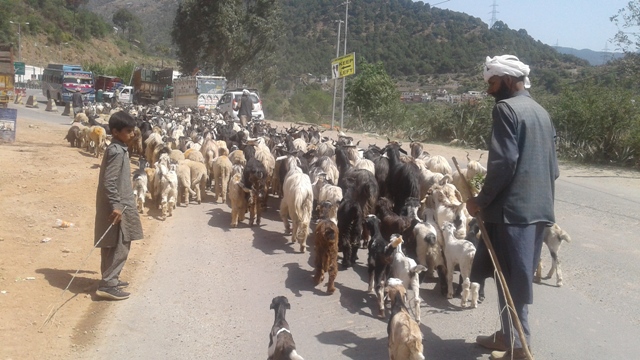Untouched... by Swachh Bharat Abhiyan
Being outsiders in Jammu and Kashmir, most of the migrant
labourers living in city slums remain untouchable for the government and it’s
welfare schemes
Akshay
Azad
Jammu,
August 12: Even though Modi government has spent billions on advertisement of
Swachh Bharat Abhiyan (Clean India Mission) in the past over three years, it
has failed to change sanitary and cleanliness conditions prevailing in slums in
and around the city of temples.
The
country wide sanitation campaign seems to be non-existent for over 400 families
of Maratha slum colony. In the absence of a drainage system, the colony
resembles a proverbial stink hole. With the onset of rainy season, the sewage
water has been overflowing onto the lanes and is seeping into shanties. The
downpour often brings water-logging, providing breeding ground for various
insects and worms, threatening water borne diseases.
The
colony located near Jammu Railway Station is house to daily wage earning
migrant labourers mostly from Maharashtra and Rajasthan. While many of its
residents are engaged in odd jobs for daily sustenance, a large number of
labourers work at Railway godowns.
Spread
over 10 kanals , the colony has been encircled by over 10 feet high walls by
the Railway department on two sides whereas the remaining two sides have
residential houses and a boundary wall of General Reserve Engineer Force (GREF)
Transit Camp. Consequently, the slum resembles a ghetto with no proper
entrance.
The
slum dwellers have piled up bags filled with sand and concrete on both sides of
the boundary wall of Railway department, making way to the external world.
Each
blue and black tarpaulin clad shanty in the colony has small pits for storage
of sewerage. After two or three days, when the pit gets filled up, they again
empty it with the help of buckets.
Most
of the times the overflowing sewerage and potable water from public taps makes
way to the narrow lanes and ultimately to the low lying areas, that have
becomes breeding ground for mosquitoes and flies.
Sangeeta
(32), who used to sell hosiery items in trains, said that all of locality
members including women have to bath at the nearby canal in the absence of
public bathrooms. "Those people who had created space in their shanties
for bath, had to abandoned their usage for want of drainage facility",
Sangeeta said and lamented, "during rainy season, the canal water becomes
filthy and the slum dwellers have to go without bath for several days."
She
also complained that due to pollution in canal water, skin diseases are common
among the dwellers including children.
"A
couple of years ago, we collected over Rs. 50,000 and constructed a 50 meters
long cemented drain and a pit to stock drainage water of the locality. A motor
pump was also installed at the pit
Being
outsiders in Jammu and Kashmir, most of the migrant labourers living in city
slums remain untouchable for the government and it's welfare schemes to pump
out water to an adjoining plot. But then GREF purchased the plot and they
constructed a boundary wall, blocking out drainage system," Nagina (60)
said, pointing towards a rusted motor pump and a dilapidated pit.
Nagina's
husband died nearly a decade ago and she lives alone after marrying off her two
daughters. She complained that whenever it rains, dirty water comes flooding
her shanty. "During every monsoon season, I have to take refuge in
adjoining shanties," Nagina said remorsefully, adding that many other
residents in the slum shared her problem.
Anand(32),
who earns his livelihood by polishing shoes at Railway station rued that though
rains often brings respite during summer but their more rains mean more
troubles for slum dweller. "The rich can enjoy rains but for us rain bring
stench, overflowing drainage water, diseases and overall miseries," Anand
remarked, adding anxiously that "I am worried that my family may get
infected with diseases anytime soon."
Raja
(47), who runs a small shop in the colony, recalled a recent visit paid by a
medical team. "The stench pervading the locality made it impossible for
doctors to stay here for even an hour. So they requested us to get checked up
and medicines outside the locality," Raja said, adding, "but we have
nowhere to go and feel compelled to continue living animal existence in this
locality. We are invisible to the government and the municipal officials."
"Apart
from being poor we are also considered outsiders, so we can't seek any facility
from the government authorities," Sourav (40), who is considered as head
of the locality said referring to State Subject laws of Jammu and Kashmir.
When
the issue was brought to the notice of Health Officer, Jammu Municipal
Corporation Dr. Saleem, he said: "The area belongs to the Railways and it
was their responsibility to ensure cleanliness in the area."
On
the condition of anonymity, an official of Civil Wing of Railway department
said that the slum area doesn't belong to the Railway department. "We have
our boundary walls and the slum area falls outside. It is the responsibility of
Jammu Municipal Corporation to provide drainage facility to them," he
added.
However,
a local shopkeeper and a native of the area claimed that the plot the land of
Maratha Colony is owned by about 8-10 persons of Jammu. "The owners of the
land are wealthy people and the slum dwellers are default caretakers of their
plots who can be evicted anytime," he said, adding that "who is
bothered about their living conditions. Being poor and outsiders in Jammu and
Kashmir, they are untouchables for the government and it's welfare
schemes."




Comments
Post a Comment